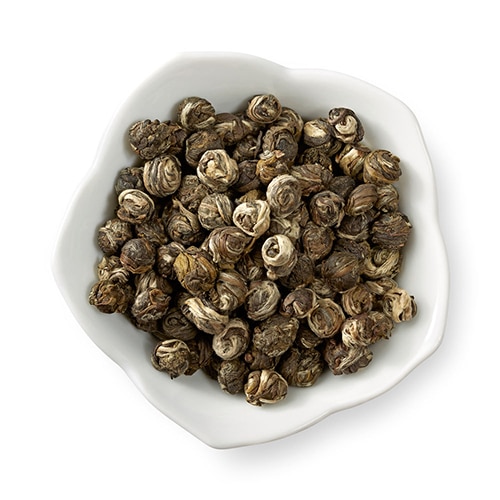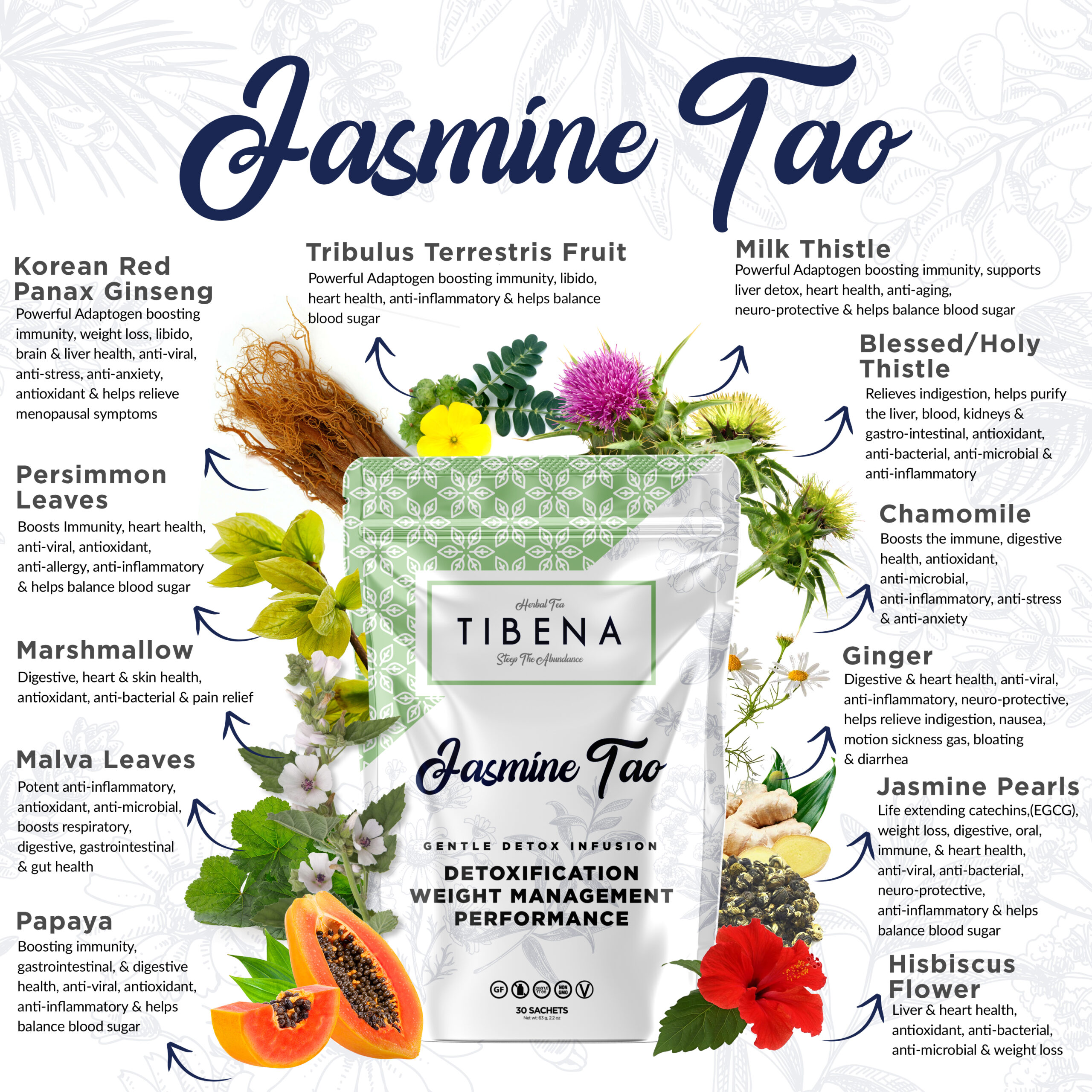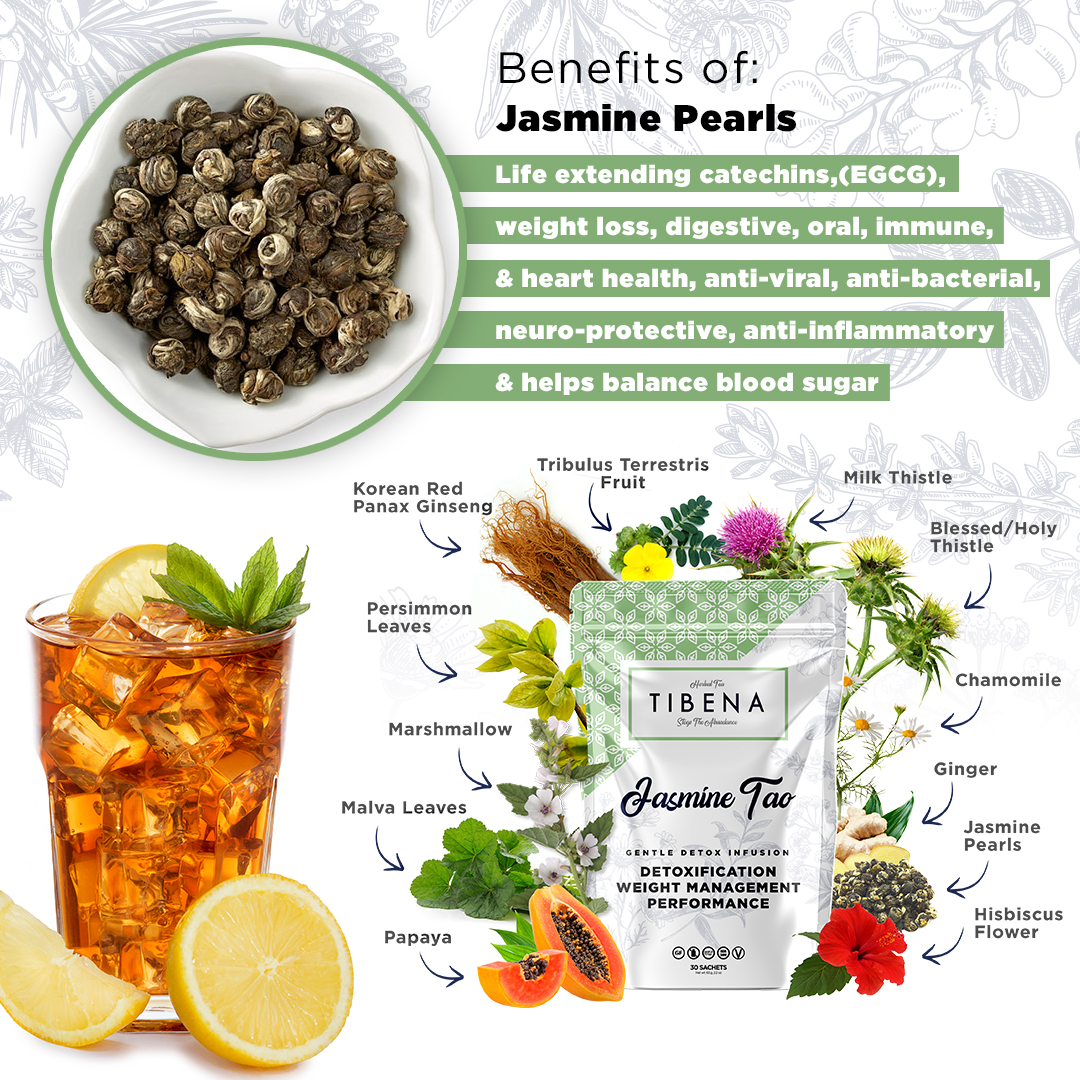
Studies have shown Potential Benefits:
Life extending catechins,(EGCG), promoting weight loss, hearth health, digestive health, oral & immune health, anti-viral, anti-bacterial, neuro-protective, anti-inflammatory & helps balance blood sugar
Jasmine Pearls
Jasmine Pearls are created with love from an ancient tradition to create a delicious, smooth green tea that can be steeped multiple times. In the early spring when the first baby green tea leaves bud they are delicately selected and harvested by hand. The baby green tea leaves are gently and meticulously hand rolled into tiny pearls. The unopened Jasmine Flowers are spread over the new baby green tea pearls and allowed to release their essence and aroma. A delicate process allowing the blossoms of the Jasmine Flower to infuse their aroma. In the early morning the Jasmine flowers are removed. This process is repeated for up to 6 days.
Jasmine Pearls contain plant-based powerful nutrients known as polyphenols called catechins. Catechin is a tannin peculiar to green tea, it is a powerful, water soluble polyphenol and antioxidant that is easily oxidized. Green tea contains four main catechin substances: EC, ECG, EGC and EGCG, all of which are inclusively called catechin. Green Tea also contains polyphenols, catechins, epigallocatechin-3-gallate (EGCG), tannin, gallic acid and caffeine.
EGCG is the most powerful; as an antioxidant it is about 25-100 times more potent than vitamins C and E and one cup of green tea has antioxidant effects greater than a serving of broccoli, spinach, carrots, or strawberries.
Catechins are natural antioxidants that help prevent cell damage and provide other benefits. Catechins can reduce the formation of free radicals in the body, protecting cells and molecules from damage. These free radicals play a role in aging and many types of diseases. The most impressive catechin in green tea is epigallocatechin-3-gallate (EGCG), which has been linked to many health benefits, from weight loss, improved blood sugar control, heart health and oral health.


https://www.ncbi.nlm.nih.gov/pubmed/21366839/ – Weight loss, fat burning
https://www.ncbi.nlm.nih.gov/pubmed/27374189 – Heart health
https://www.ncbi.nlm.nih.gov/pubmed/16707877 – Improved oral health
https://www.ncbi.nlm.nih.gov/pmc/articles/PMC2748751/ – Anti-inflammatory, heart health
https://www.ncbi.nlm.nih.gov/pubmed/20142827 – Positive energy balance and weight management
May speed up your metabolism 4–5% and increase fat burning by 10–16%.
https://www.ncbi.nlm.nih.gov/pubmed/21366839/ – Assists the body with burning fat
https://www.ncbi.nlm.nih.gov/pubmed/25335111 Green tea polyphenols have been shown to protect LDL (bad) cholesterol from oxidizing
https://www.ncbi.nlm.nih.gov/pubmed/21432397 – Health Benefits of Green Tea:1) Tea polyphenols are powerful antioxidants. They decrease the oxidation of LDL cholesterol and lower the risk of heart disease, and also inhibit action of reactive oxygen species mediating the oxidation of DNA associated with carcinogenesis 2) Tea polyphenols induce detoxifying enzymes, glucuronosyl transferases, eliminating active forms of carcinogens and other toxicants, accounting for the lower cancer risk. 3) Tea polyphenols lower duplication rates of cancer cells and inhibit the growth of cancer, increase apoptosis and lower angiogenesis. 4) Tea polyphenols alter the intestinal bacterial flora, suppressing undesirable bacteria and favoring growth of beneficial bacteria. 5) Aging phenomena, and diseases associated with the formation of reactive oxygen species (ROS) are inhibited.
https://www.ncbi.nlm.nih.gov/pubmed/15161246 – Heart Health
https://www.ncbi.nlm.nih.gov/pubmed/24172310 – or instance, an analysis of 5 studies discovered that people who drank 3 cups (710 ml) or more of green tea daily had a 21% lower risk of heart disease on average.
https://www.ncbi.nlm.nih.gov/pubmed/26318390 – 1–3 cups (237–710 ml) of green tea per day had a 19% lower risk of heart attacks and a 36% reduced risk of strokes, compared to people that drank less than 1 cup (237 ml) daily
https://www.ncbi.nlm.nih.gov/pubmed/16707877 – Catechins are a group of polyphenols that may help protect against tooth decay — or cavities — by killing plaque-forming bacteria like Streptococcus mutans
https://www.ncbi.nlm.nih.gov/pubmed/29887975 – Oral Health
https://www.ncbi.nlm.nih.gov/pubmed/18388413 – May combat bad breath by reducing odor-causing bacteria
https://www.ncbi.nlm.nih.gov/pubmed/22448141 – A review of 8 studies in more than 5,600 people discovered that people who regularly drank teas like green tea — the most common base for jasmine tea — had a 15% lower risk of Parkinson’s disease than non-tea drinkers.
https://pubmed.ncbi.nlm.nih.gov/28805687/ – https://www.ncbi.nlm.nih.gov/pmc/articles/PMC6152177/
Antiviral – The inhibitory effects of EGCG on multiple viruses indicate that this compound is a potential alternative agent for viral diseases.
https://www.sciencedaily.com/releases/2011/06/110602143214.htm – Immune health
Jasmine Pearls Studies
https://www.ncbi.nlm.nih.gov/pubmed/27824892 – An analysis of 26 studies in over 52,500 people with daily consumption of teas high in EGCG (green tea) — to a 35% lower risk of brain disorders, including Alzheimer’s disease
https://www.ncbi.nlm.nih.gov/pubmed/12428980 – Jasmine tea made from green tea may lower your risk of type 2 diabetes containing EGCG, which may help your body use insulin more effectively and reduce blood sugar levels.
https://www.ncbi.nlm.nih.gov/pubmed/19437116 – A comprehensive review of observational studies found that women who drank the most green tea had an approximately 20–30% lower risk of developing breast cancer, one of the most common cancers in women
https://www.ncbi.nlm.nih.gov/pubmed/23803878 – An analysis of 17 studies in 1,133 people showed that green tea consumption significantly reduced fasting blood sugar and insulin levels
https://www.ncbi.nlm.nih.gov/pubmed/25052177 – An analysis of 12 studies in more than 760,000 people found that drinking 3 cups (710 ml) or more of tea daily was linked to a 16% lower risk of type 2 diabetes
https://www.ncbi.nlm.nih.gov/pubmed/18296347 – https://www.ncbi.nlm.nih.gov/pubmed/19325799
Studies show ECGC in green tea reduced tumor size, stimulated cancer cell death, and suppressed the growth and spread of cancer cells.
https://academic.oup.com/aje/article/167/1/71/185454 – One study observed that men drinking green tea had a lower risk of advanced prostate cancer
https://www.ncbi.nlm.nih.gov/pubmed/28454102 – An analysis of 29 studies showed that those drinking green tea were around 42% less likely to develop colorectal cancer
https://www.ncbi.nlm.nih.gov/pubmed/15350981 neuro-protective
https://www.ncbi.nlm.nih.gov/pmc/articles/PMC6493995/ – neuro-protective
https://www.ncbi.nlm.nih.gov/pubmed/26092629 – neuro-protective – Green tea can have various positive effects on the brain. Helping to reduce the risk of dementia, a common neurodegenerative disorder in older adults.
https://www.ncbi.nlm.nih.gov/pubmed/16968850 – Longevity – Researchers studied 40,530 Japanese adults over 11 years. Those who drank 5 or more cups of green tea a day were significantly less likely to die during the study period.
https://www.sciencedirect.com/science/article/abs/pii/S1047279709001653 – Longevity – Another study involving 14,001 older Japanese individuals found that those who drank the most green tea were 76% less likely to die during the 6-year study period
https://www.ncbi.nlm.nih.gov/pmc/articles/PMC5537891/ – Theanine is believed to be the main sleep-promoting compound in green tea. It works by reducing stress-related hormones and neuron excitement in your brain, which allows your brain to relax
https://www.ncbi.nlm.nih.gov/pmc/articles/PMC5703787/ – Evidence suggests that drinking 3–4 cups of low-caffeinated green tea throughout the day may reduce fatigue and levels of stress markers,and improve sleep quality.
https://www.ncbi.nlm.nih.gov/pmc/articles/PMC2855614/#B35 – Beneficial effects of green tea: A literature review
and Composition information from 119 research papers.
https://www.ncbi.nlm.nih.gov/pubmed/1614996 – Antimutagenic and anticarcinogenic effects – anti-cancer
https://www.ncbi.nlm.nih.gov/pubmed/15331020 – Diabetes – Effect of green tea on blood glucose levels and serum proteomic patterns in diabetic (db/db) mice and on glucose metabolism in healthy humans –
https://www.ncbi.nlm.nih.gov/pubmed/10200295 – Joint Pain – Prevention of collagen-induced arthritis in mice by a polyphenolic fraction from green tea
https://www.ncbi.nlm.nih.gov/pubmed/12587987 – Antioxidant
https://www.ncbi.nlm.nih.gov/pubmed/2677434 – Antibacterial and bactericidal activities of Japanese green tea
https://www.ncbi.nlm.nih.gov/pubmed/14688042 – Antifungal – Multiple effects of green tea catechin on the antifungal activity of antimycotics against Candida albicans
https://www.ncbi.nlm.nih.gov/pubmed/11237171 – Hearth Health – green tea – a review
https://www.ncbi.nlm.nih.gov/pubmed/16957869 – Memory – Brain Health
https://www.ncbi.nlm.nih.gov/pubmed/15555387 – May prevent stroke
https://bmcpharma.biomedcentral.com/articles/10.1186/1471-2210-4-18 – Diabetes
https://www.ncbi.nlm.nih.gov/pubmed/15464031 – Digestion/Gastrointestinal – Pharmacological effects of green tea on the gastrointestinal system”
